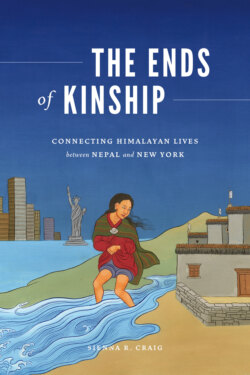Читать книгу The Ends of Kinship - Sienna R. Craig - Страница 17
На сайте Литреса книга снята с продажи.
AUTHORITATIVE KNOWLEDGE
ОглавлениеIn reflecting on Yangdron’s story, I see Kunzom’s insistence that she take a pregnancy test as care-full and bold. Although Kunzom is not a mother, she possesses enough of a certain kind of knowledge to assert herself for Yangdron’s benefit. In some ways, Yangdron had been resigned to let the reality of her pregnancy unfold to the slower rhythm of an expanding belly and to not talking as a form of protection, even as she was, at the same time, learning through this research project about the difficult experiences that previous generations of Mustang’s women have lived through and how those hardships are intertwined with silence.
This leads me to the relationship between silence and sharing. In Mustang, as in many other parts of the world, women’s status—as reproductive beings but also as human beings—are subject to a kind of scrutiny that is rarely applied to men. In homes and villages, or in the communication pathways that link Mustang to Kathmandu to New York, privacy can be a thin curtain, pleated by gossip. Sex and sexuality are tossed tacitly back and forth in village melodies, hearthside innuendo, text messages. The question “What is happening to me?” hangs in the air.
I thought I was dying when my blood came for the first time. My mother handed me some wool and told me nothing.
My body burned when I squatted to pee in the fields. What did it mean?
Sister-in-law held me as I pushed that first baby out. She was more scared than I was.
The man’s substance is sticky! After my husband finished his effort, it felt like he had glued my legs together, so nobody else could open me up.
To please a man, rock back and forth like when you thresh grain. To please a woman, let the man drink enough so he falls asleep!
If the afterbirth is slow to come, danger.
These are the voices of older Mustang women, those mostly in their sixties, seventies, eighties. But confusion, contradiction, and disjuncture between what is known and what is practiced also effect younger women:
I thought I could not get pregnant the first time I had sex. But I did.
I lost one baby when it was four months inside me. The doctor in Kathmandu said he would take care of me, but he put in something that caused me pain [an IUD]. He didn’t tell me. I bled so much, I thought that I would die.
I studied global health and feminism in college, but there I was at the clinic anyway, waiting for something I never thought I’d need.
A woman in her forties was sterilized by tubal ligation. She tells me that her womb was removed but that her monthly cycles continue. A new mother wipes away her colostrum. She has been told that this yellow liquid is impure, that she should wait to feed her infant until the white milk comes, sweet and salty on the tongue.
We live the knowledge we are given.
